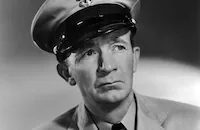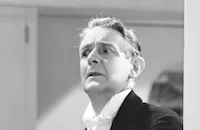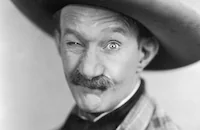Nice Girl?

Brief Synopsis
Cast & Crew
William A. Seiter
Deanna Durbin
Franchot Tone
Walter Brennan
Robert Stack
Robert Benchley
Film Details
Technical Specs

Synopsis
In Stillwater, Connecticut, Professor Oliver Wendel Holmes Dana's household is a mess, as his housekeeper, Cora Foster, is the only one working efficiently. Oliver, the principal of the local high school, has three daughters, would-be actress Sylvia, mischievous Nancy, and quiet Jane. Jane worries that she is too much the "nice girl," as her boyfriend, Don Webb, is more interested in his custom-made car than in her. When the Van de Meer Foundation then sends scientist Richard Calvert to the Dana home to consider Oliver for a fellowship, the family is surprised to find that instead of the bearded scientist they had expected, Richard is a distinguished gentleman who immediately attracts Jane's fancy. His attention to her, however, is deflected by her two sisters and the arrival of Don. At the local Fourth of July celebration, Jane finally seems to gain the interest of Richard, only to lose it when she is called away to sing. Richard leaves for New York the next day, and Don offers to loan his car to Jane to drive him there. When Don's car malfunctions along the way during a rainstorm, Jane is forced to stay alone with Richard at his home. Dressed in his elegant sister's pajamas, Jane drinks champagne with Richard, but while she strikes a seductive pose, he remains a true gentleman. He then receives a phone call from his mother, and when Jane overhears him allaying his mother's fears by calling Jane "just one of the Dana girls," she feels a fool and rushes home. When she arrives in her hometown at the break of dawn, the horn in Don's car goes off, waking the entire town. Later that morning, Jane confesses all to her father, who is relieved that nothing happened and tells her that the town could use "some five cent scandals." At the charity bazaar, the gossip flows as freely as the punch, and the head gossip, postman Hector Titus, announces to the multitude that Jane and Richard are engaged. Jane then arrives at the bazaar, and is mystified when she receives congratulations from all. When Don goes to comfort her, she becomes upset by his "taking her for granted," and falsely confirms the engagement, showing a South Seas "wedding" ring as proof of her betrothal. Richard arrives in town, as his trip to Australia has been postponed, to inform Oliver that he has been awarded the fellowship. The two men enter the bazaar, where they mistakenly accept congratulations for Richard's engagement, not Oliver's fellowship. When Richard realizes what has really happened, he agrees to along with the deception until the townspeople try to force him and Jane into a quickie wedding. Thinking fast, they enact a "breakup" with the help of her father. The upset Don has enlisted in the army, however, so Jane goes to the local army post to find him. The two make up, then Jane sings for the soldiers, with special attention to her soldier.

Director

William A. Seiter
Cast

Deanna Durbin

Franchot Tone

Walter Brennan

Robert Stack

Robert Benchley

Helen Broderick

Ann Gillis

Anne Gwynne

Elisabeth Risdon

Nana Bryant
George Billings
Tommy Kelly
Marcia Mae Jones
Roy Harris
Kenneth Howell

Leonard Carey
Frank Sully

Nell O'day
Kathryn Adams
Edmund Macdonald

William Davidson
Florence Shirley
Mira Mckinney
Dorothy Vaughan
Louise Miller

James Finlayson
Selmer Jackson
Eddy Waller
Pat West
William Ruhl
Henry Roquemore
Sammy Mckim
Tim Davis
Charles Stubbs
Joanne Tree
Julie Gibson
Frances Coonan
Florence Houston
Max Wagner
Don Murphy
Phil Warren
Frank Austin
Jerry Marlowe
Blanche Payson
William Desmond
Crew
Bernard B. Brown
Bernard W. Burton
Hughie Charles
Eddie Cherkose
Richard Connell
Stephen Foster
Aldo Franchetti
R. A. Gausman
Bernie Grossman
Walter Jurmann
Joseph Lapis
Gladys Lehman
Joseph A. Mcdonough
Martin Obzina
Jack Otterson
Ross Parker
Joe Pasternak
Jacques Press
Charles Previn
Andres De Segurola
Andres De Segurola
Frank Skinner
George Thomas Jr.
Joseph Valentine
Vera West

Film Details
Technical Specs

Articles
Nice Girl?
Always a little too eager to meddle in the affairs of grown-ups, Durbin's character here finds herself attracted to a business associate of her professor father, almost losing her longtime boyfriend in the process. The box office ante was upped even more by the casting of Robert Stack as the boyfriend. Stack had caused a minor national uproar by bestowing upon Durbin her first screen kiss in First Love (1939).
Realizing the need to give the romantically handsome young Stack a run for his money, producers cast Franchot Tone as the older man. A respected actor (and ex-husband of Joan Crawford), Tone never quite took off as a Hollywood leading man, so it wasn't that much of a come-down for him to appear in a teen comedy. Besides, the cast sported a few other notables: literary wit and occasional actor Robert Benchley as Durbin's father, wisecracking character actress Helen Broderick, and Walter Brennan, who shortly after this film's release won his third Best Supporting Actor Academy Award. To top it off, Tone came out of the project with a five year, ten-picture deal with the producing studio Universal Pictures.
For the film's finale, shortly after Stack's character goes off to serve in the army, Durbin took the stage to sing a patriotic number, "Thank You, America," shot at Fort MacArthur, California, in front of more than 200 extras. Before the film's February 1941 release, she was called back to the studio to record an alternate number, "There'll Always Be an England," for the UK release, the Battle of Britain having taken place right before production began. A third ending with Durbin singing "Thank You, America" in Spanish, was added for the Latin American release.
Durbin, of course, sings several other songs, including "Love at Last," which was a working title for the film. She did not, however, sing the song "I'm Nineteen Now," written especially for her and presented to her on her birthday at the start of production.
Returning to the question of the question mark, the New York Times noted that Nice Girl? was Durbin's first adult role and the first of her pictures to be censored. At one point, her younger sister (winningly played by Ann Gillis) reads from a true confessions magazine. Her line "I trusted Gerald until one night..." was cut from the picture.
Director: William A. Seiter
Producer: Joe Pasternak
Screenplay: Richard Connell, Gladys Lehman, based on the play Nice Girl by Phyllis Duganne
Cinematography: Joseph Valentine
Editing: Bernard W. Burton
Art Direction: Jack Otterson
Music: Frank Skinner (uncredited)
Cast: Deanna Durbin (Jane Dana), Franchot Tone (Richard Calvert), Walter Brennan (Hector Titus), Robert Stack (Don Webb), Robert Benchley (Oliver Dana)
By Rob Nixon

Nice Girl?
Robert Stack, 1919-2003
Stack was born in Los Angeles on January 13, 1919 to a well-to-do family but his parents divorced when he was a year old. At age three, he moved with his mother to Paris, where she studied singing. They returned to Los Angeles when he was seven, by then French was his native language and was not taught English until he started schooling.
Naturally athletic, Stack was still in high school when he became a national skeet-shooting champion and top-flight polo player. He soon was giving lessons on shooting to such top Hollywood luminaries as Clark Gable and Carol Lombard, and found himself on the polo field with some notable movie moguls like Darryl Zanuck and Walter Wanger.
Stack enrolled in the University of Southern California, where he took some drama courses, and was on the Polo team, but it wasn't long before some influential people in the film industry took notice of his classic good looks, and lithe physique. Soon, his Hollywood connections got him on a film set at Paramount, a screen test, and eventually, his first lead in a picture, opposite Deanna Durbin in First Love (1939). Although he was only 20, Stack's natural delivery and boyish charm made him a natural for the screen.
His range grew with some meatier parts in the next few years, especially noteworthy were his roles as the young Nazi sympathizer in Frank Borzage's chilling The Mortal Storm (1940), with James Stewart, and as the Polish flier who woos a married Carole Lombard in Ernst Lubitsch's To Be or Not to Be (1942).
After serving as a gunnery officer in the Navy during World War II, Stack returned to the screen, and found a few interesting roles over the next ten years: giving Elizabeth Taylor her first screen kiss in Robert Thorp's A Date With Judy (1948); the leading role as an American bullfighter in Budd Boetticher's The Bullfighter and the Lady (1951); and as a pilot in William Wellman's The High and the Mighty (1954), starring John Wayne. However, Stack saved his best dramatic performances for Douglas Sirk in two knockout films: as a self-destructive alcoholic in Douglas Sirk's Written on the Wind (1956), for which he received an Academy Award nomination for supporting actor; and sympathetically portraying a fallen World War I pilot ace who is forced to do barnstorming stunts for mere survival in Tarnished Angels (1958).
Despite proving his capabilities as a solid actor in these roles, front rank stardom oddly eluded Stack at this point. That all changed when Stack gave television a try. The result was the enormously popular series, The Untouchables (1959-63). This exciting crime show about the real-life Prohibition-era crime-fighter Eliot Ness and his G-men taking on the Chicago underworld was successful in its day for several reasons: its catchy theme music, florid violence (which caused quite a sensation in its day), taut narration by Walter Winchell, and of course, Stack's trademark staccato delivery and strong presence. It all proved so popular that the series ran for four years, earned an Emmy for Stack in 1960, and made him a household name.
Stack would return to television in the late '60s, with the The Name of the Game (1968-71), and a string of made-for-television movies throughout the '70s. His career perked up again when Steven Spielberg cast him in his big budget comedy 1941 (1979) as General Joe Stillwell. The film surprised many viewers as few realized Stack was willing to spoof his granite-faced stoicism, but it won him over many new fans, and his dead-pan intensity would be used to perfect comic effect the following year as Captain Rex Kramer (who can forget the sight of him beating up Hare Krishnas at the airport?) in David and Jerry Zucker's wonderful spoof of disaster flicks, Airplane! (1980).
Stack's activity would be sporadic throughout the remainder of his career, but he returned to television, as the host of enormously popular Unsolved Mysteries (1987-2002), and played himself in Lawrence Kasden's comedy-drama Mumford (1999). He is survived by his wife of 47 years, Rosemarie Bowe Stack, a former actress, and two children, Elizabeth and Charles, both of Los Angeles.
by Michael T. Toole
Robert Stack, 1919-2003
Quotes
Trivia
Deanna Durbin receives her first screen kiss from Robert Stack
Notes
The working title of this film was Love at Last. The play on which the picture was based was first presented by the senior class of New York's American Academy of Dramatic Arts on January 25, 1929, but no information about commercial productions has been found. According to Hollywood Reporter, this was actress Deanna Durbin's ninth film with producer Joe Pasternak and cameraman Joseph Valentine, and the first film in which she played an adult character. A July 1940 Hollywood Reporter news item reported that writers Ralph Block and Frederick Kohner were working on a "final screen play" for the film, but the extent of their contribution to the released film has not been confirmed. Early in the production of this film, Universal held a nineteenth birthday party for Durbin, during which she was presented with the song "I'm Nineteen Now," written especially for her by Walter Jurmann and Bernie Grossman. In mid-January 1941, the film's finale sequence was shot on location at Fort MacArthur, CA, with the use of approximately two hundred extras. During the production of this film, director William A. Seiter agreed to a two-picture contract with Universal, cinematographer Joseph Valentine endorsed a five-year agreement, and actor Franchot Tone signed a five-year, ten-picture deal with the studio.
NTY pointed out that, for the first time, a Deanna Durbin film was slightly censored by the Hays Office, as the line "I trusted Gerald until one night...," as read by Ann Gillis' character "Nancy Dana" from a "confession" magazine, was edited from the film. Universal publicity materials state that this was the first film for the studio by noted character actor Walter Brennan, who was loaned to the studio by Samuel Goldwyn. Hollywood Reporter production charts include George Ernest in the cast, but his appearance in the released film has not been confirmed. In late February 1941, Durbin was recalled to the studio to shoot and record additional musical numbers for the foreign release of the film. The song "There'll Always Be an England" replaced "Thank You, America" in the British release, and a Spanish-language version of "Thank You, America" was produced for the Latin-American release. Modern sources claim that the film's title was changed from Nice Girl to Nice Girl? to improve business, as the original title was deemed "too virginal to intrigue ticketbuyers." Durbin had previously worked with director Seiter on the 1940 Universal film It's a Date (see AFI Catalog of Feature Films, 1931-40; F3.2185).














